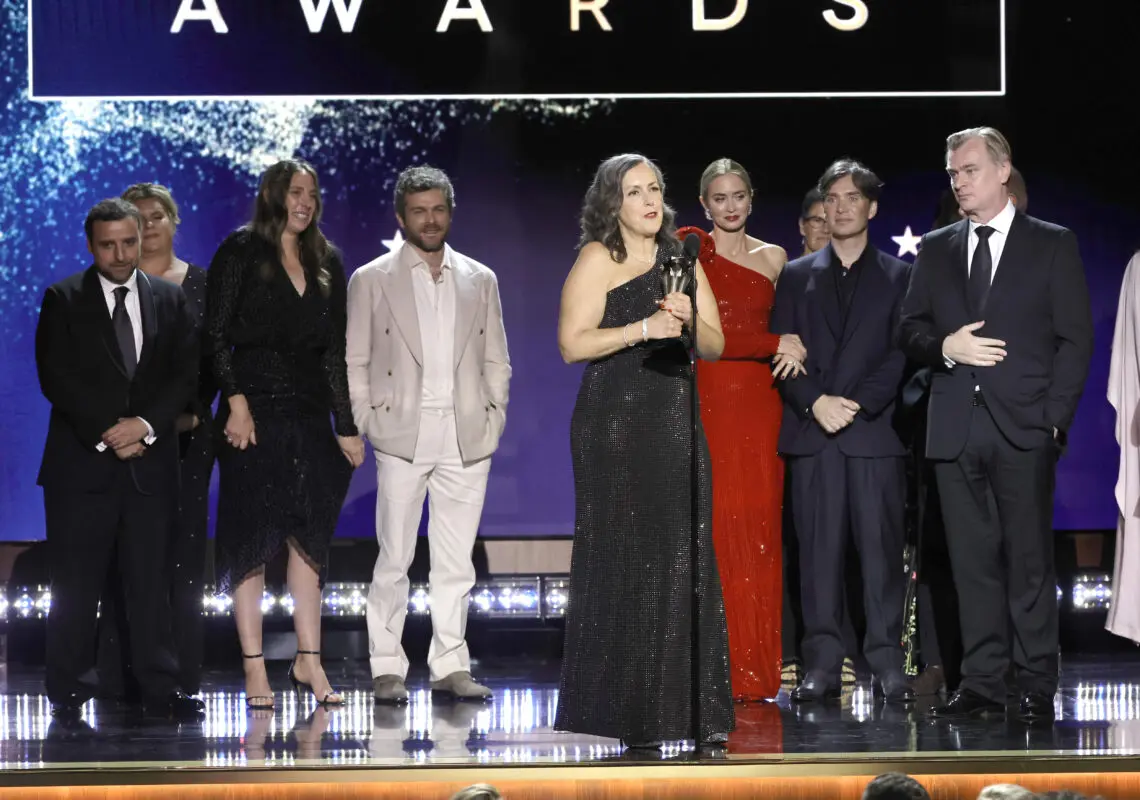In January 1999, the Critics Choice Awards presented “Saving Private Ryan” with its top prize of best picture. The film’s director, Steven Spielberg, took the stage and proclaimed of the organization, “This group is here to stay.” Never doubt the master, as 25 years later, the awards show is set to celebrate three decades with the 30th Annual Critics Choice Awards live on E! on Jan. 12.
In a time when awards shows seem to be floundering, the Critics Choice Assn. appears to be flourishing; A-list stars regularly show up for the ceremony, and its record at predicting future Oscar winners is fairly on point. The show also generates lots of buzz and memorable moments.
Joey Berlin, CEO of the Critics Choice Assn., has served as executive producer on every Critics Choice Awards broadcast since its inception with the film awards in 1995 (TV awards began in 2011) and has a few favorites. That includes 2010’s ceremony, “when Sandra Bullock and Meryl Streep sealed their tie with a memorable kiss after first looking like they were going to wrestle for the best actress trophy.” And just this January, there was “the tearful acceptance speech Harrison Ford made after his Lifetime Achievement Award presentation.”
Popular on Variety What will happen this year? With film nominations being announced Dec. 12, we take a look at what to expect and who’s calling the shots.
Who are the voters?
According to Berlin, the awards are determined by the 575 voting members of the CCA; there are another 100 non-voting members. “It is a remarkably diverse and inclusive group who qualify to vote by reaching a large audience on a regular basis with their coverage of new films and/or television,” notes Berlin. In short, it’s a group “of leading film and television critics and entertainment reporters — people whose job it is to keep up with a continuous tidal wave of new shows and movies and help audiences find the good stuff.”
Unique categories
While the film categories encompass the usual suspects — picture, director, actors — they also stand out with a few different races. In addition to honoring an acting ensemble, they have a category specifically for best young actor/actress and one for best comedy. Like the Oscars, they have 10 best picture nominees, but their other races are open to six nominees — sometimes more.
With more contenders and a smaller voting pool, this can occasionally lead to ties — which has provided some wonderful moments. In addition to the Bullock/Streep showdown, there was the year Glenn Close and Lady Gaga tied for best actress. And in 2003, there were only three nominees, and two of them — Jack Nicholson and Daniel Day-Lewis —tied. But the third nominee, Robin Williams, still got on stage at the insistence of Nicholson and ended up doing a spot-on imitation of him.
The nominees
Overall, the Critics Choice Awards is a good sign for Oscar hopefuls. Earlier this year, nine of the 10 movies nominated for best picture at the CCAs went on to repeat at the Oscars — with “Zone of Interest” ultimately landing a nod over “Saltburn”; “Oppenheimer” and Christopher Nolan were named best picture and director — a feat they repeated at the Oscars; and three of the four acting winners also matched up with the Academy Awards.
Generally expected to make the cut for best picture are a wide swath of films. That includes musicals (“Wicked,” “Emilia Pérez”) and sequels to previous awards-friendly films (“Gladiator II,” “Dune: Part Two”) along with true stories (“Sing Sing,” “Nickel Boys,” “September 5,” “A Complete Unknown”) and what feel like good, old-fashioned epics (“Blitz,” “The Brutalist,” “Conclave”).
But with critics voting, there could also be room for more intimate (and independent) movies — Sean Baker’s “Anora” seems a lock for some major awards, while Jesse Eisenberg’s “A Real Pain” is also a popular pick. Critics also love Mike Leigh’s “Hard Truths.” Even movies that might seem outside the Oscar voter comfort zone like “Babygirl,” “The Substance” or “The Room Next Door” could surprise.
Critics are also more likely to consider films not in the English language, which could be great news for Walter Salles’ “I’m Not Here” and its acclaimed lead actress, Fernanda Torres. Germany’s “The Seed of the Sacred Fig” and India’s “All We Imagine as Light” both are gaining awards season traction.
The new guard
Only a handful of the actors tipped for nominations are returning winners, including Nicole Kidman in “Babygirl,” Angelina Jolie in “Maria,” Adrien Brody in “The Brutalist” and Denzel Washington in “Gladiator II.” And there’s sure to be many previous nominees in the race — Amy Adams in “Nightbitch,” Marianne Jean-Baptiste in “Hard Truths,” Colman Domingo in “Sing Sing,” Timothée Chalamet in “A Complete Unknown,” Cynthia Erivo in “Wicked,” Ralph Fiennes and Stanley Tucci in “Conclave,” Felicity Jones in “The Brutalist,” June Squibb in “Thelma,” Aunjanue Ellis-Taylor in “Nickel Boys,” Saoirse Ronan in both “The Outrun” and “Blitz” and Edward Norton in “A Complete Unknown.”
But what’s surprising is how many first-time nominees could make up the roster. That includes actors from “Anora” (Mikey Madison, Yura Borisov), “Didi” (Joan Chen), “Queer” (Daniel Craig), “Wicked” (Ariana Grande and Jonathan Bailey), “Emilia Pérez” (Karla Sofia Gascón, Zoe Saldaña and Selena Gomez) “Conclave” (Isabella Rossellini), “The Piano Lesson”(Danielle Deadwyler), “September 5” (Leonie Benesch, John Magaro and Peter Sarsgaard), “Sing Sing” (Clarence Maclin) and “A Complete Unknown” (Monica Barbaro.)
It includes a pair of “Succession” brothers potentially facing off in best supporting actor — Kieran Culkin in “A Real Pain” and Jeremy Strong in “The Apprentice.” The contenders also includes actors who have never been nominated before, such as Guy Pearce (“The Brutalist”) and Hugh Grant (“Heretic”). And the critics could choose to recognize the underrated talents of such stars as Demi Moore in “The Substance” and Pamela Anderson in “The Last Showgirl.”

 Italian
Italian







